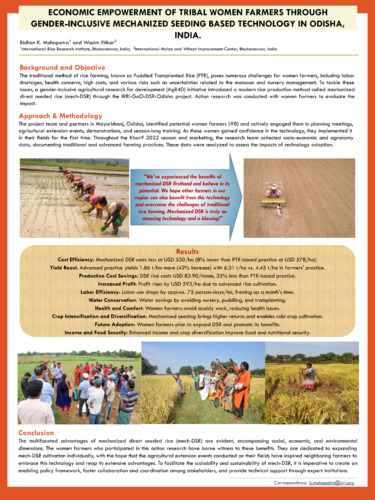Economic empowerment of tribal women farmers through gender-inclusive mechanized seeding based technology in Odisha, India
Abstract
This study is evidence of action research with eight women tribal smallholder farmers of the Mayurbhanj district of Odisha, India and its impact on enhancement of crop productivity and profitability through technology and varietal adoption, and crop diversification. Because of agricultural R4D innovations of a genderinclusive DSR-Odisha project, the women farmers are trained in mechanized direct-seeded rice (DSR) based advanced rice production practice. These eight women farmers were imparted with season-long, hands-on training on advanced practice during the execution of demonstrations in their fields during kharif 2022. As ‘seeing is believing’, they attended various extension events. In the same season, these farmers had also their own traditional/farmer practice, that is puddled transplanted rice (PTR). We kept a record of the costs of cultivation, crop-cutting experiments based grain yields, and income earned through both practices. We estimated the average cost of cultivation in mechanized DSR-based practice (US$530/ha) was 8% lower than the PTR-based farmers’ practice (US$578/ha). The benefit–cost ratio increased from 2.01 (traditional practice) to 3.22 (advanced practice) due to the innovations the women farmers adopted. Moreover, there was a yield advantage of 1.86 ton/ha (42% higher) in advanced practice (6.31 ton/ha) over the farmers’ practice (4.45 ton/ha). Overall, there was crop intensification with an increase in profit of US$593/ ha due to the advanced practice of rice cultivation. Moreover, due to the adoption of mechanized seeding– based innovations, the scope for cultivating rabi crops opened for these women farmers, further resulting in crop diversification for income, food and nutritional security.

